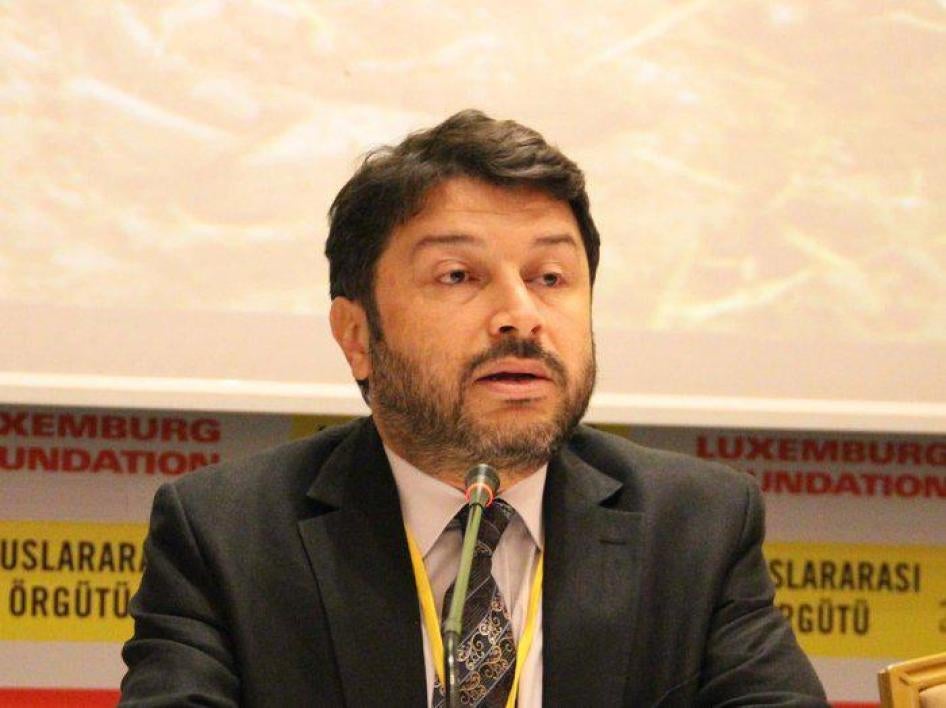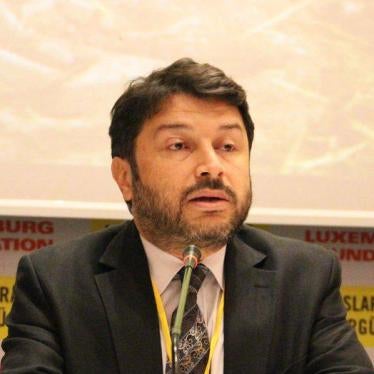(Istanbul) – Sham criminal proceedings against Amnesty International Turkey’s honorary chair Taner Kılıç and 10 other human rights defenders are set to resume on June 21, 2018, Human Rights Watch said.
The rights advocates are facing bogus, unsubstantiated criminal charges of membership in a terrorist organization over their peaceful work. The trial should be halted, the eleven acquitted, and Kilic set free as there is no compelling evidence against them of anything approaching a crime.
“Taner Kılıç should be released immediately and unconditionally,” said Hugh Williamson, Europe and Central Asia director at Human Rights Watch. “The whole trial has been a grave injustice from the start, and Kılıç and the other 10 defenders should not be facing any charges, and under no circumstances should they be convicted.”
The prolonged detention of Kılıç, a lawyer, in the absence of any credible evidence is particularly unjust, Human Rights Watch said. Kılıç was detained in Izmir on June 6, 2017, and was sent to pretrial detention three days later. The court hearing the case, Istanbul heavy penal court no. 35, ordered Kılıç’s release on January 31. But the prosecutor appealed the decision, and before Kılıç had been released, another court again ordered his detention. On February 1, Istanbul Heavy Penal Court no. 35 reversed its decision to release him and ruled that he should be re-arrested.
The other 10, who became widely known on social media as the “Istanbul 10,” were detained on July 5, 2017, in a police raid on a human rights training workshop on the island of Büyükada, Istanbul. Among them are some well-known names. They are: Özlem Dalkıran, a member of Citizens’ Assembly nongovernmental organization, and a founding member of Amnesty International Turkey and its first chair; Nalan Erkem, a lawyer and Citizens’ Assembly member; İlknur Üstün of the Women’s Coalition, a nongovernmental group; İdil Eser, Amnesty International Turkey director at the time of her arrest; Veli Acu, member of the Human Rights Agenda Association; Günal Kurşun, a lawyer and Ankara representative of the Human Rights Agenda Association; Şeyhmus Özbekli, a lawyer and member of Rights Initiative; Nejat Taştan, coordinator of the Association for Monitoring Equal Rights; Ali Gharavi, a Swedish human rights information security consultant; and Peter Steudtner, a German well-being trainer and coach.
An Istanbul court sent six of them to pretrial detention on July 18 and two more on July 22. Steudtner and Gharavi were released and allowed to leave Turkey. The trial against the 10 began on October 25, and the eight held in pretrial detention were released at that hearing.
At Kılıç’s first hearing, in Izmir on October 26, the court decided to merge his case with that of the Istanbul defenders, and they have been tried together in subsequent hearings. Steudtner and Gharavi are being tried in their absence.
Human Rights Watch has seen a copy of a recent police report examining the contents of Kılıç’s mobile phone, which confirms there is no evidence that Kılıç had the encrypted communication app ByLock, a claim that has formed a central part of the prosecution’s case against him.
The Turkish authorities claim that ByLock was widely used by followers of the US-based cleric Fethullah Gülen, whom they accuse of masterminding the July 2016 attempted military coup in Turkey. Lawyers acting for Kılıç and Amnesty International in previous hearings presented two independent reports by forensic experts supporting Kılıç’s defense that he had never had the ByLock app.
“The case against Taner Kılıç and the Istanbul 10 is emblematic of the real danger faced by people in Turkey who stand up for the rights of ordinary people or voice criticism of the authorities,” Williamson said. “Defenders in Turkey face media smear campaigns, condemnation by state officials, bogus prosecution, and arbitrary imprisonment simply for doing their jobs.”







